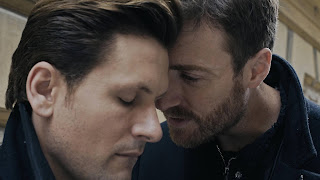TV Review - Lovecraft Country
Jonathan Majors (Da 5 Bloods and The Last Black Man in San Francisco) stars as Atticus Freeman, a young black soldier who served in the Korean War. It's now 1955 and he's returning home to where his family lives in the south side of Chicago. In addition to being a good soldier, a good fighter, he's also very well read. He's very literate and is very well versed in science-fiction and fantasy literature. Therefore, when strange things start to occur that can only be explained in science-fiction and fantasy books, he's able to handle it fairly well.
When he arrives in Chicago, he searches for his father who sent him a strange letter. Yet, his father is nowhere to be found. Atticus instead stays with his father's brother, Atticus' uncle George, played by Courtney B. Vance (American Crime Story and ER), as well as George's wife, Hippolyta, played by Aunjanue Ellis (When They See Us and Quantico). Atticus realizes that his father's disappearance is linked to a greater mystery. His journey to solve that mystery opens up a wave of one supernatural phenomenon after another. One new phenomenon is handled in each episode.As a result, each episode feels different but disjointed from the last. It's not like Peele's other TV series The Twilight Zone (2019). Each episode in that series is supposed to be separate. There is a narrative flow where one supernatural thing that happens follows from the last, but it still feels disjointed and jarring in how the characters jump from one supernatural thing to another with no pause or reflection. The characters nor the series ever stops to take a breath to absorb the crazy supernatural thing that they just experienced. One example would be a Native American character, known as two-spirit. That character is so brushed off without much reflection or consideration.
It's not like The X-Files because that 90's series never ratcheted the supernatural stuff to a level that was extremely over-the-top. This series ratchets up the supernatural stuff in every episode from nothing at all to ridiculously over-the-top in almost no time flat and it creates a kind of whiplash in every episode that it never really takes time from which to recover. CW's Supernatural does a similar thing, but that series has a sense of humor and a tongue-in-cheek tone that's akin to Buffy, the Vampire Slayer (1997). This series has darkly humorous or brief comedic moments, but it's not enough to counter-balance the ratcheted nature of this series.
How that racism is then weaved into the greater supernatural stories is initially intriguing. In the first episode, the racism is almost incidental to the supernatural stuff. The racism is almost more terrifying than whatever supernatural horror is teased. Nevertheless, the series as mentioned is ratcheted to ridiculously over-the-top levels. It's so ridiculous that I ceased to be engaged by it or perceive it as any kind of threat. The horror gets to be a bit eye-rolling. There are consequences, but none of it ever lands with any real impact for me. As a result, I lost interest in Atticus' journey to solve the mysteries.
Michael Kenneth Williams (When They See Us and The Night Of) also co-stars as Montrose Freeman, the father to Atticus. He disappears and needless to say he's found. As I said, I did lose interest in Atticus' journey to solve the mysteries. One of which was finding out what happened to his father and why he disappeared. What I thought was fascinating is that in the fifth episode is that it's revealed that Montrose is gay. It's also the fourth time that Williams has played a gay character, after his roles in The Wire (2002), Hap and Leonard (2016) and When We Rise (2017).Williams is of course a great actor, but Williams is straight. At this point, it would be nice to have openly gay black actors play these roles. Episode 5 involves Montrose going to a gay bar or gay nightclub where various LGBTQ people interact. That scene involves openly gay black actors. Why none of them could have been hired to play his role is beyond me. Another interesting factoid is that in When We Rise, both Williams and Majors were cast to play the same character. Williams plays Ken Jones as an older man and Majors plays Ken Jones as a younger man. Instead of playing the same character, here they play father and son, which works. Not since Star Trek: Deep Space Nine (1993) has there been a sci-fi or supernatural series about a black father and black son working together.
Rated TV-MA-LSV.
Running Time: 1 hr. / 10 eps.
Available on HBO.














Comments
Post a Comment